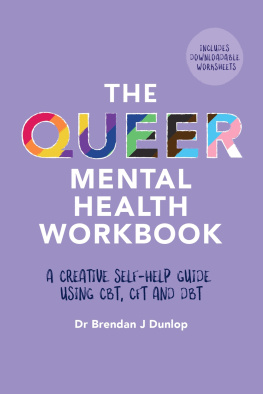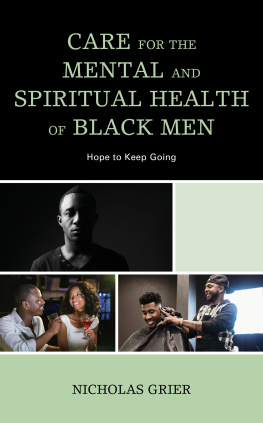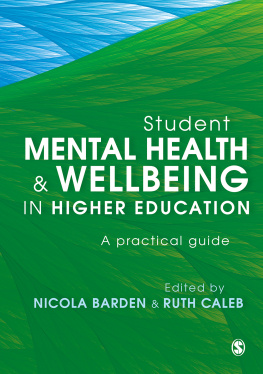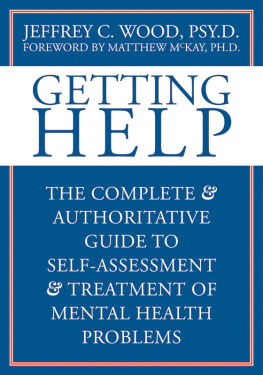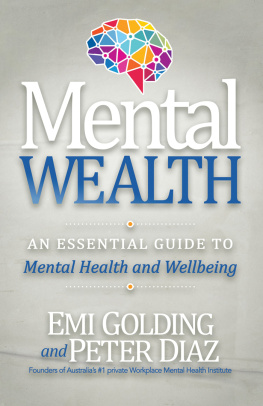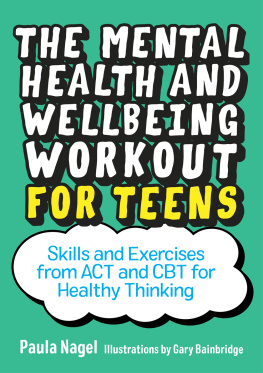Contents
Page list

of related interest
Trans Survival Workbook
Owl Fisher and Fox Fisher
ISBN 978 1 78775 629 8
eISBN 978 1 78775 630 4
The Trans Self-Care Workbook
A Colouring Book and Journal for Trans and Non-Binary People
Theo Lorenz
ISBN 978 1 78775 343 3
eISBN 978 1 78775 344 0
Hell Yeah Self-Care!
A Trauma-Informed Workbook
Alex Iantaffi and Meg-John Barker
ISBN 978 1 78775 245 0
eISBN 978 1 78775 246 7
The Anxiety Book for Trans People
How to Conquer Your Dysphoria, Worry Less and Find Joy
Freiya Benson
ISBN 978 1 78775 223 8
eISBN 978 1 78775 224 5
THE QUEER
MENTAL
HEALTH
WORKBOOK
A Creative Self-Help Guide
Using CBT, CFT and DBT
Dr Brendan J Dunlop

First published in Great Britain in 2022 by Jessica Kingsley Publishers
An imprint of Hodder & Stoughton Ltd
An Hachette Company
Copyright Dr Brendan J Dunlop 2022
All activities and images are copyright of Brendan J Dunlop unless otherwise indicated.
All rights reserved. No part of this publication may be reproduced, stored in a retrieval system, or transmitted, in any form or by any means without the prior written permission of the publisher, nor be otherwise circulated in any form of binding or cover other than that in which it is published and without a similar condition being imposed on the subsequent purchaser.
Trigger warning: This book mentions abuse, anxiety, depression, eating disorders, self-harm, suicide, stress and trauma.
Disclaimer: The information contained in this book is not intended to replace the services of trained medical professionals or to be a substitute for medical advice. You are advised to consult a doctor on any matters relating to your health, and in particular on any matters that may require diagnosis or medical attention.
A CIP catalogue record for this title is available from the British Library and the Library of Congress
ISBN 978 1 83997 107 5
eISBN 978 1 83997 108 2
Jessica Kingsley Publishers policy is to use papers that are natural, renewable and recyclable products and made from wood grown in sustainable forests. The logging and manufacturing processes are expected to conform to the environmental regulations of the country of origin.
Jessica Kingsley Publishers
Carmelite House,
50 Victoria Embankment,
London, EC4Y 0DZ, UK
www.jkp.com
Contents
Acknowledgements
This book hugely benefited from the thoughts, input, opinions and constructive criticism of the following fantastic individuals:
Dr Ben Campbell
Rosy Wilson
Dr Alex Williams
Gail Quartly-Bishop
Dr Talen Wright
Reiss Akhtar
Dr Vanessa Fay
Dr Peter Taylor
Jennifer Fleming
Dr Roshini Prince-Navaratnam
Dr Ian Gill
Dr Richard Falcon
Dr Katy Bourne
Dr James Lea (BSc, DClinPsy, SFHEA) (he/they) co-authored the Relationships and Intersectionality chapters. James is a principal clinical psychologist, dialectical behaviour therapist (DBT), group work practitioner, clinical researcher and supervisor. At present, he works as Admissions Director and Clinical Tutor in clinical psychology at The University of Manchester and has a private practice offering psychotherapy and supervision to individuals and groups. He previously held the post of clinical lecturer at Bangor University and has worked clinically in a variety of NHS services. His research focuses on qualitative explorations within gender, sexuality and relationship diversity (GSRD) groups, self-harm and suicide. James has passion and expertise working psychologically with marginalized and oppressed groups, in particular those people who identify as belonging to the GSRD and/or LGBTQIA+ communities.
PART 1
BEING QUEER
Chapter 1
INTRODUCTION
To be lesbian, gay, bisexual, transgender, queer, intersex, asexual, non-binary, pansexual (LGBTQ+) or anything other than heterosexual (straight) and/or cisgender (identification with the sex you were assigned at birth) is to feel different. This does not just happen people feel different and othered because they notice that the world is not really designed for them. The assumption and dominant narrative that exists in the Global North is that all people are cishet (cisgender and heterosexual). A felt sense, even from a very young age, that you do not fit in can be incredibly difficult. The fallout from this can stick around for years. Many LGBTQ+ people grow up thinking that there is something inherently wrong with them, and this can become internalized. This can leave LGBTQ+ people with difficult-to-manage emotions arising from living in a discriminatory and unbalanced world.
This book aims to help LGBTQ+ people explore aspects of their identity, psychological wellbeing and mental health experiences at their own pace. I recognize that LGBTQ+ people reading this will all have different life experiences and different social systems around them and have developed different responses to these experiences, people, systems and stories. Because of this, there will be variation in where different people feel they identify on the spectrum of mental health and wellbeing.
Language is incredibly important in shaping our experiences. To this end, I have tried to choose the words I use carefully. For example, you will not see the term mental illness or mental disorder used in this book, because I think such phrases have some negative connotations. These descriptions were often used to refer to people who were admitted to asylums, and the perception was that such people could be unpredictable, or even dangerous. It was not until 1967 that homosexuality was removed as a mental illness from the Diagnostic and Statistical Manual (the DSM; the manual psychiatrists use to diagnose people with mental health disorders). Shockingly, it was only in 2013 when gender identity disorder was replaced with gender dysphoria (the distress caused by a mismatch between someones gender identity and their sex assigned at birth). Of course, even having transness associated with the DSM is heavily contested, as why should being trans be framed as a difficulty or disorder?!
Instead, you will see me refer to mental health difficulties. I think this is much more representative of what is actually going on someone is having a difficult time with their mental health. It does not mean that they are ill or disordered, it just means things are rocky at the moment, and that things have happened to them which have been difficult to deal with. This is the basis for the Power Threat Meaning Framework (Johnstone & Boyle, 2018), one of the psychological approaches I have drawn on to influence this book. I recognize that some people do identify with the term mental illness or mental disorder and use this. If this is relevant and helpful for you to understand your experiences, then absolutely use this.
I should also justify why I have chosen to use the term Queer throughout this book. While this term has historical negative connotations (it was used as a slur towards LGBTQ+ people for many years) the LGBTQ+ community has begun to reclaim this word as a symbol of identity and power an example of the changeable nature of the stories and words that exist around us. Some within the LGBTQ+ community think of and identify with Queer as an independent group of people. I completely recognize and respect this. While not wishing to invalidate or erase the identity of those who identify with this term as distinct from other parts of the community, I have used the term Queer in this book to represent all those who are not cisgender and/or heterosexual.

